.
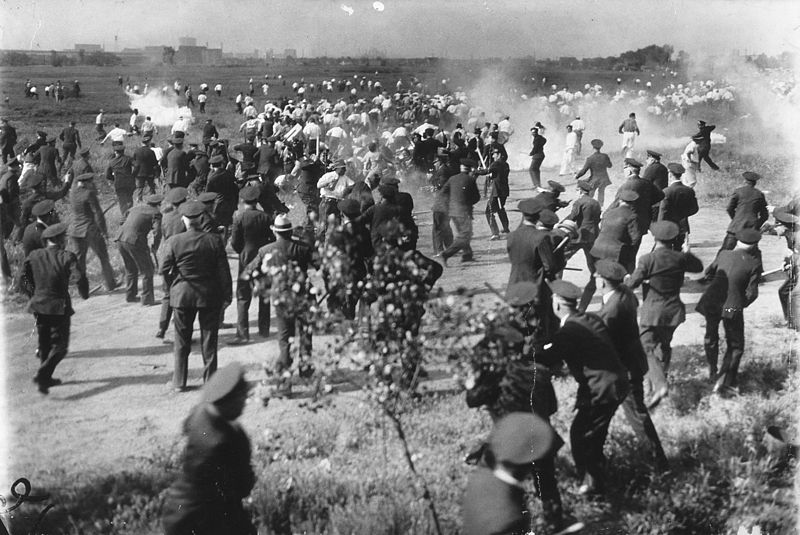
The Chicago Memorial Day Incident [aka the Memorial Day Massacre], during the "Little Steel" strike: photographer unknown, for U.S. Senate, 30 May 1937 (National Archives and Records Administration)
'On Memorial Day, May 30, 1937, police opened fire on a parade of striking steel workers and their families at the gate of the Republic Steel Company, in South Chicago. Fifty people were shot, of whom 10 later died; 100 others were beaten with clubs.' -- Eyewitness Dorothy Day, in Selected Writings
So he with difficulty and labour hard
Mov'd on, with difficulty and labour hee.
-- Milton: Paradise Lost, II
The days of our years are threescore years and ten; and if by reason of strength they be fourscore years, yet is their strength labour and sorrow; for it is soon cut off, and we fly away.
-- Psalm 90:10
With the word labour I was, of course, familiar. Coupled mysteriously with its mate capital, this abstract term was always turning up in my father's conversation, and it occurred and reoccurred in the technical journals and reports of of companies which lay on the library table. 'Water plentiful and labour docile', 'The wages of labour are falling to their natural level'... were phrases which puzzled me... I never visualized labour as separate men and women of different sorts and kinds... labour was an abstraction, which seemed to denote an arithmetically calculable mass of human beings, each individual a repetition of the other...
-- Beatrice Webb, My Apprenticeship (1926)
-- Milton: Paradise Lost, II
The days of our years are threescore years and ten; and if by reason of strength they be fourscore years, yet is their strength labour and sorrow; for it is soon cut off, and we fly away.
-- Psalm 90:10
With the word labour I was, of course, familiar. Coupled mysteriously with its mate capital, this abstract term was always turning up in my father's conversation, and it occurred and reoccurred in the technical journals and reports of of companies which lay on the library table. 'Water plentiful and labour docile', 'The wages of labour are falling to their natural level'... were phrases which puzzled me... I never visualized labour as separate men and women of different sorts and kinds... labour was an abstraction, which seemed to denote an arithmetically calculable mass of human beings, each individual a repetition of the other...
-- Beatrice Webb, My Apprenticeship (1926)

Open battle between striking teamsters armed with pipes and police in the streets of Minneapolis during 1934 strike: photographer unknown, June 1934 (National Archives and Records Administration)
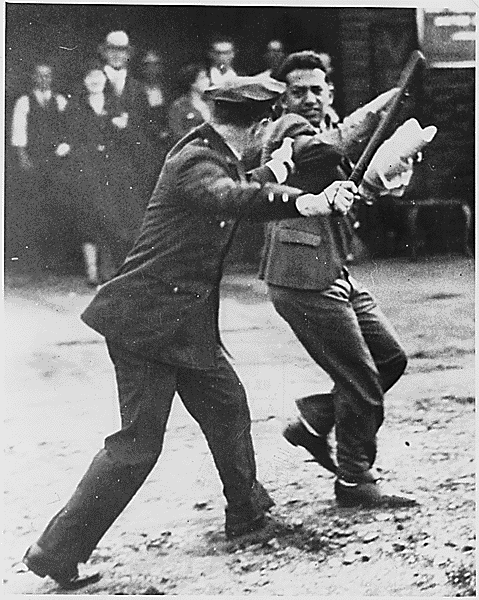
Labor strikes, San Francisco: police and strikers battle: photographer unknown, July 1934 (Franklin D. Roosevelt Presidential Library)

San Francisco dock strike: photographer unknown for International News Photos, New York, July 1934 (Farm Security Administration/Office of War Information Collection, Library of Congress)

Strike scene, Rincon Hill, San Francisco during San Francisco waterfront strike: photographer unknown, 3 July 1934 (1934 International Longshoremen's Association General Strikes of San Francisco Collection, Bancroft Library, U. of California)

Strikers surround produce trucks during San Francisco waterfront strike: photographer unknown, 12 July 1934 (1934 International Longshoremen's Association General Strikes of San Francisco Collection, Bancroft Library, U. of California)

Food raids during San Francisco waterfront strike: photographer unknown, 13 July 1934 (1934 International Longshoremen's Association General Strikes of San Francisco Collection, Bancroft Library, U. of California)

Man arrested by police during San Francisco waterfront strike: photographer unknown, July 1934 (1934 International Longshoremen's Association General Strikes of San Francisco Collection, Bancroft Library, U. of California)

Strikers surging down Market Street during San Francisco waterfront strike: photographer unknown, July 1934 (1934 International Longshoremen's Association General Strikes of San Francisco Collection, Bancroft Library, U. of California)

Police fire at crowd, Potrero Hilll [?], during San Francisco waterfront strike: photographer unknown, July 1934 (1934 International Longshoremen's Association General Strikes of San Francisco Collection, Bancroft Library, U. of California)

Pickets at Embarcadero during San Francisco waterfront strike: photographer unknown, July 1934 (1934 International Longshoremen's Association General Strikes of San Francisco Collection, Bancroft Library, U. of California)

Police surround strikers, Embarcadero, during San Francisco waterfront strike: photographer unknown, July 1934 (1934 International Longshoremen's Association General Strikes of San Francisco Collection, Bancroft Library, U. of California)

Funeral of men slain during San Francisco waterfront strike: photographer unknown, July 1934 (1934 International Longshoremen's Association General Strikes of San Francisco Collection, Bancroft Library, U. of California)
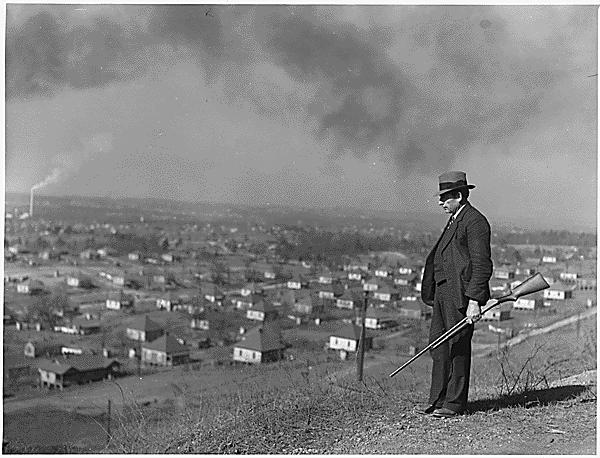
Guard at company town, Jefferson County, Alabama: photo by Arthur Rothstein, February 1937 (Farm Security Administration/Office of War Information Collection, Library of Congress)

Striking longshoremen during waterfront strike in San Francisco, California: photo by Dorothea Lange, March 1937 (Farm Security Administration/Office of War Information Collection, Library of Congress)

A political problem before the voters of San Francisco, California: photo by Dorothea Lange, March 1937 (Farm Security Administration/Office of War Information Collection, Library of Congress)
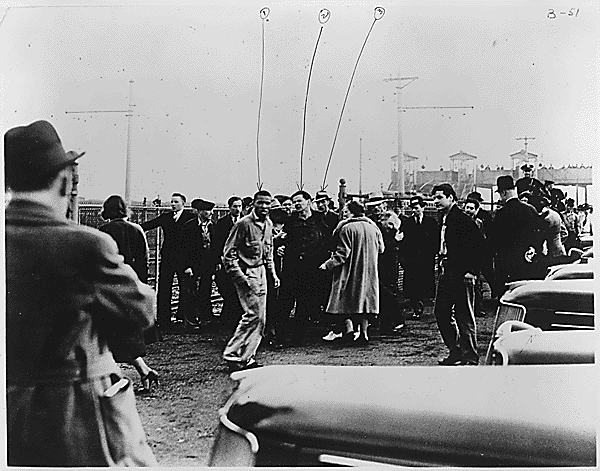
Labor strike, Ford Motor Company: large group on men and women standing, man being held back physically by several in group: photographer unknown: photographer unknown, 26 May 1937 (Franklin D. Roosevelt Presidential Library)
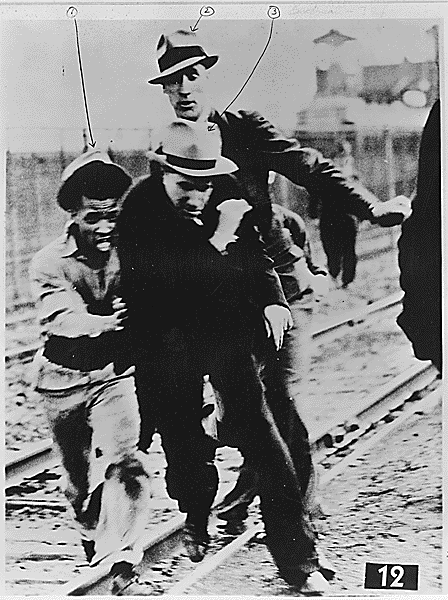
Labor strike, Ford Motor Company: men in physical altercation: photographer unknown, 26 May 1937 (Franklin D. Roosevelt Presidential Library)
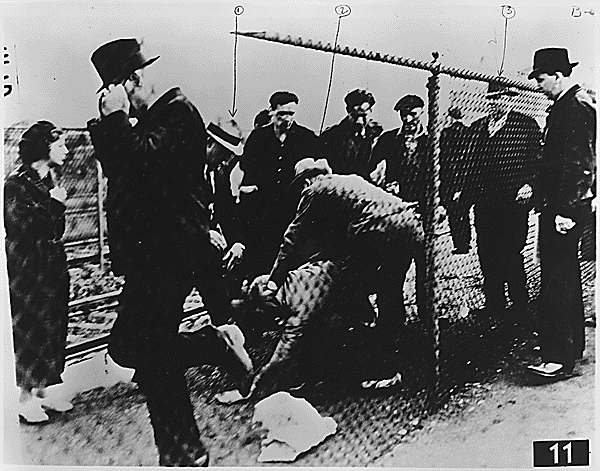
Labor strike, Ford Motor Company: men in physical altercation, woman observing on far left photographer unknown, 26 May 1937 (Franklin D. Roosevelt Presidential Library)
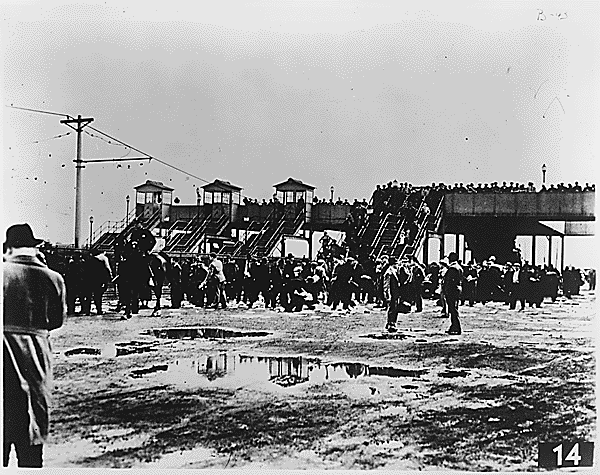
Labor strike, Ford Motor Company: distant shot of large crowd: photographer unknown, 26 May 1937 (Franklin D. Roosevelt Presidential Library)
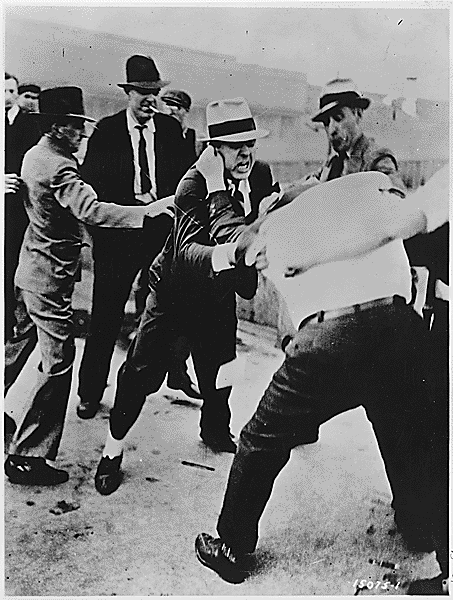
Labor strike, Ford Motor Company: men in physical altercation: photographer unknown, 26 May 1937 (Franklin D. Roosevelt Presidential Library)
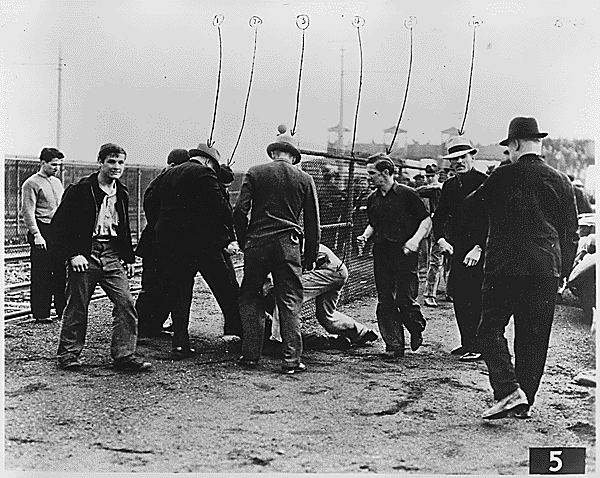
Labor strike, Ford Motor Company: men in physical altercation: photographer unknown, 26 May 1937 (Franklin D. Roosevelt Presidential Library)
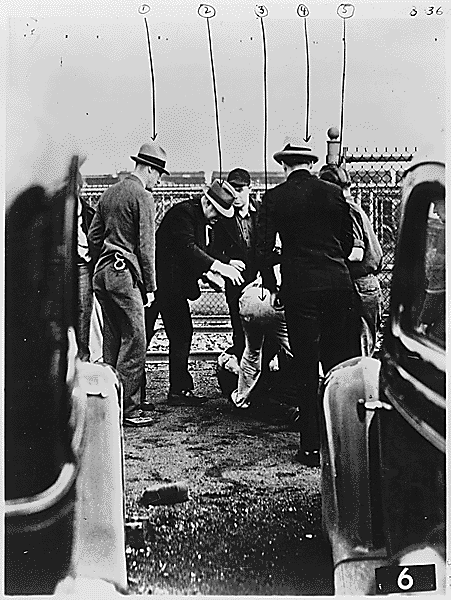
Labor strike, Ford Motor Company: men in physical altercation: photographer unknown, 26 May 1937 (Franklin D. Roosevelt Presidential Library)
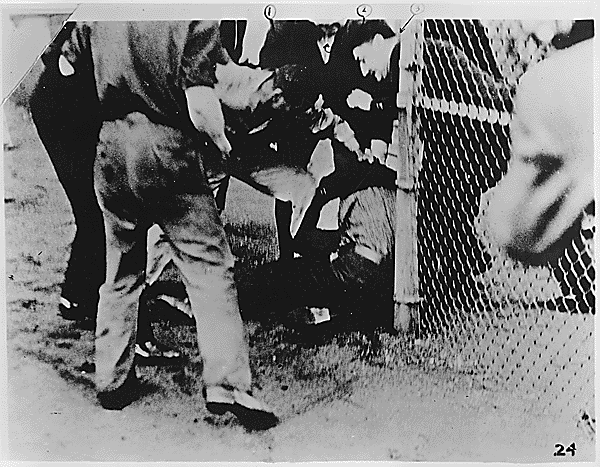
Labor strike, Ford Motor Company: men in physical altercation: photographer unknown, 26 May 1937 (Franklin D. Roosevelt Presidential Library)
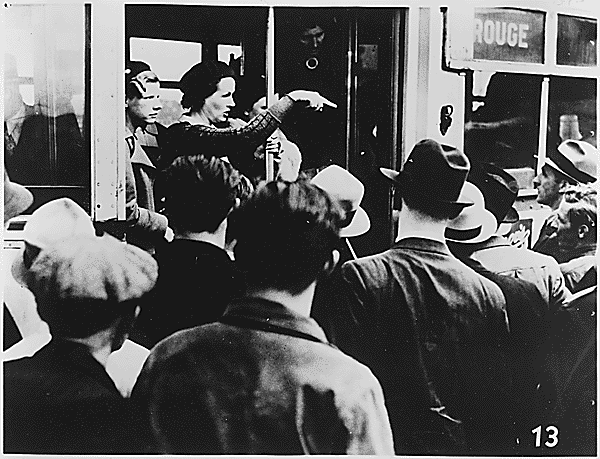
Labor strike, Ford Motor Company: group shot, woman standing in foreground and pointing finger with another woman standing to her left: photographer unknown, 26 May 1937 (Franklin D. Roosevelt Presidential Library)

Packing company strike. Cambridge, Maryland: photo by Arthur Rothstein, June 1937 (Farm Security Administration/Office of War Information Collection, Library of Congress)

Packing company strike. Cambridge, Maryland: photo by Arthur Rothstein, June 1937 (Farm Security Administration/Office of War Information Collection, Library of Congress)

Strike pickets, New York, New York: photo by Arthur Rothstein, December 1937 (Farm Security Administration/Office of War Information Collection, Library of Congress)

Picket line at the King Farm strike. Near Morrisville, Pennsylvania: photo by John Vachon, August 1938 (Farm Security Administration/Office of War Information Collection, Library of Congress)

Migrant workers hired as strikebreakers after the King Farm strike. Near Morrisville, Pennsylvania: photo by John Vachon, August 1938 (Farm Security Administration/Office of War Information Collection, Library of Congress)

Bakersfield, California. Outside Farm Security Administration (FSA) "grant" office during cotton pickers' strike: photo by Dorothea Lange, November 1938 (Farm Security Administration/Office of War Information Collection, Library of Congress)

Miner's sons bringing home salvaged coal during coal strike. Kempton, West Virginia: photo by by John Vachon, May 1939 (Farm Security Administration/Office of War Information Collection, Library of Congress)

Miner's sons salvaging coal during coal strike. Kempton, West Virginia: photo by by John Vachon, May 1939 (Farm Security Administration/Office of War Information Collection, Library of Congress)

Salinas Valley, California. Deputized "vigilantes" armed with clubs guard entrance to lettuce fields during lettuce strike: photo by Dorothea Lange, September 1939 (Farm Security Administration/Office of War Information Collection, Library of Congress)

Picketing. Copper miners on strike waiting for scabs to come out of mines. Ducktown, Tennessee: photo by Marion Post Wolcott, September 1939

Copper miners on strike waiting for scabs to come out of mines. Ducktown, Tennessee: photo by Marion Post Wolcott, September 1939 (Farm
Security Administration/Office of War Information Collection, Library of
Congress)

Coca-Cola strike, Sikeston, Missouri: photo by John Vachon, May 1940 (Farm
Security Administration/Office of War Information Collection, Library of
Congress)

Employees of Coca-Cola plant on strike, Sikeston, Missouri: photo by John Vachon, May 1940 (Farm
Security Administration/Office of War Information Collection, Library of
Congress)

Yabucoa, Puerto Rico. At a strike meeting: photo by Jack Delano, January 1942 (Farm
Security Administration/Office of War Information Collection, Library of
Congress)

Yabucoa, Puerto Rico. At a strike meeting in the town of Yabucoa: photo by Jack Delano, January 1942 (Farm
Security Administration/Office of War Information Collection, Library of
Congress)





11 comments:
NEAT..
wasn't George Romney a leader in (some of these) protest demonstration .. I also seem to recall his marching in NAACP protest...
some info about George Romney here:
http://en.wikipedia.org/wiki/George_W._Romney
this Willard "Mitt" Romney sure ain't his father !
and I just heard that this Paul Ryan at about age 40 ran ONE marathon... said he did it in 2 hours ! Turns out the actually did run a marathon
HOWEVER, his time was NOT 2 hours IT WAS $ HOURS..
I've run 7 marathons my personal best was when I was age 53... 3hrs, 51 mins & 'change'
notice in these photos only one black man ? and the numbers with arrows I guess the FBI trying to identify (except for the black man) those
"Uppity Whites"
"I never visualized labour as separate men and women of different sorts and kinds... labour was an abstraction, which seemed to denote an arithmetically calculable mass of human beings, each individual a repetition of the other..."
Webb is at the heart of the business here. What a terrible gift is the strength that comes from labour and sorrow!
Ed, you're right to bring up the question of race. The unions in the UK don't have a great record when it comes to the treatment of Black and Asian workers. One key factor in the change was a strike led by Asian women at Grunwicks in 1977.
The photographs are incredible. The struggle seems more real than any strike I've been a part of, so much more urgency. What is wonderful is the faces; people tasting a little measure of autonomy.
I'm pretty sure these particular forms of resistance are impossible in the West right now. Plenty of panem et circenses to go round for the time being, courtesy of ASDA (Walmart) and BSkyB.
Looking at these pictures reminded me of something I wrote last year: "Fortunately, the numbers soon increased, dramatically so. Until eventually I could become a part of the crowd. And it was within this crowd, though I cannot place the moment itself, that I realized, despite what I recall recently telling you, I’m not seeking a cause with which to align myself so much as I am seeking an occasion to become strictly a body. I live so much in words. I feel awkward, even with people I know & love, when standing in the flesh, face to face, being seen. I have a confidence with verbal and written expression that I do not in my physical individuality & the space I cut in this world alone. What I want of a crowd, whose motivations, though myriad, are directed against or toward — in a kind of strange harmony, a music to which you would not listen for leisure — that which we may not know or be willing to say by name, is a momentary disintegration — a burning away of myself until all that is left is the presence of a body, not even a voice, in protest. That alone." I re-read this now and realize that perhaps "burning" is not the greatest word to have used. Looking at these photos, I suspect "beating" is more appropriate. I suspect we will see more actions like these depicted in the coming years. (Indeed, the rest of the world already is.)
WB invokes the circus; coincidentally it seems to have hit the mainland just last week -- that surrealistically scripted pre halloween carnival culminating in the spectacle of the man with the world's biggest gun going off on an eight minute tipsoid half gainer into the heart of Planet Gibberish.
But whatever. These have been long laborious sleepless and parlous nights of thinking about the changing and largely now lost meanings of labour.
From C17, except in the special use for childbirth, it seems the word labour gradually lost its habitual association with pain and began to be perceived as a name for a general social activity, with the inevitable complementary lexical inflation of abstraction. At some historical point, as Raymond Williams notes (mid to late 18C), labour became a measurable and calculable component in political economy.
"Where labour, in its most general use, had meant all productive work, it now came to mean that element of production which in combination with capital and materials produced commodities. This new specialized use belongs directly to the systematized understanding of capitalist productive relationships...
"[By C20] labour had developed two modern senses: first the economic abstraction of the activity; secondly, the sociological abstraction of that class of people who performed it..."
When Beatrice Webb speaks of "labour docile", she is, in Williams' terms, suggesting a description of a class.
In this town, a high percentage of the actual physical work is done by "illegal aliens", who are happy to have it, and work harder and at far lower wages than would a bonafide citizen.
"What a terrible gift is the strength that comes from labour and sorrow!"
Hey, Comrade Tom,
Thanks for posting those photos. A number of them- Ford Motor Plan and, I think, Chicago Memorial Day- were taken by my father. He sold the rights for a bit of cash, thus "photographer unknown."
Happy Labor Day,
Woody Haut
Tom,
As Wooden Boy says, these photos are incredible -- and all too credible too. And as Woody Guthrie sang, "This land is your land, this land is my land. . . " from (as these photos show) Chicago to Minneapolis to SF to Jefferson County AL to Detroit to Cambridge MD to NYC to Morrisville PA to Bakersville CA to Kempton WVA to Salinas CA to Duck Town TN to Sikeston MS to Yabucoa PR. . .
. . . yet is their strength labour and sorrow; for it is soon cut off, and we fly away.
9.2
grey whiteness of fog against invisible
ridge, shadowed corner of redwood fence
in foreground, sound of wave in channel
position “tells entire life,”
such a sense of scene
uninterrupted, materialized,
whether as or in each
grey white of fog against top of ridge,
pelican flapping across toward horizon
Use me
but I want to be paid
why is this so strange
I have to eat
before I'm trashed
I am anoher scavenger
combing through
the ruins
for a job
that does not exist
others lived and died
wanting
this technicality
I owe my life to it
until the numbers
did not match
my voice killed
in front of the others
over and over
Tell me
did they make it
to Gold Hill
past the border
Labor is and always has been the single greatest cost that capitalists must deal with. They view labor as an expense; they don’t see human beings. A long time ago, someone pointed out that no single individual can become wealthy by using only the energy of his or her own person. Individual wealth derives from the labor of many people. It’s energy stolen from others in a myriad of ways. Capitalism makes a point of ignoring this, and of minimizing the role of labor.
The factory so simple
from outside
once in
complexities
like the break room
a forest
danger, resentment, claim
trees firmly planted
You find out later
it was a mistake
then, too late
something already created
when you turned to go
But give me this at least
it is something to ignore
at least eat
feed the others too
between wars
The productive relationship
lasted
between observable transits of Venus
a span of years measured
to be of use, beneficial
and strong
recorded by a few scientists
well, more than a few.
At least one was cooked
said not to have been eaten.
These events were of importance
were mostly about longitude
a new attitude
on the map.
Do you have one
we could trade
or should you pay
some beads some trinkets?
Aporia, are you
the same as conundrum
or a bit different
other sense of lost
knowing it
as opposed to
realizing it later
once out of it?
Such as
teacher by day
detective at night
pay the same
different dues.
http://www.youtube.com/watch?v=YFv1kqdl2VQ&NR=1&feature=endscreen
Post a Comment